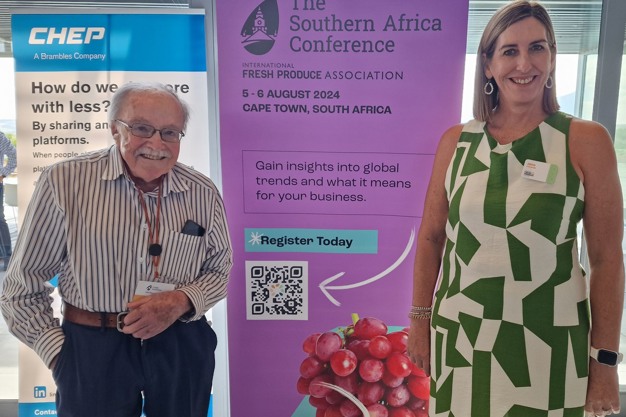Heavy lifting is required for the new management of Transnet to turn around the main fruit export port in Cape Town, currently ranked as one of the worst performing compared to other ports in the region. Mike Walwyn, director of the South African Association of Freight Forwarders (SAFFE) said, "Port productivity is at an all-time low, crane movements is 12 per hour, despite the fleet improvement. In the past Cape Town had 25 container movements per hour. Weather disruptions are insignificant if productivity improves. The recovery level is just too slow."

Mike Walwyn, speaker at the seminar hosted in by Jane Strijdom, GM of IFPA Southern Africa, in Cape Town this week.
Walwyn, was speaking at the International Fresh Produce Association South Africa's Fresh Solutions seminar in Cape Town this week on the topic of Rebuilding South Africa's Logistic Landscape. "Our logistics system has things that are broken and in need of repair. Transnet is the key with Transnet Port Terminals that has the most impact on a daily basis. The fruit industry group on Cape Town's Port has around 200 WhatsApp messages a day. It is telling that things are wrong. All this time responding to these messages can be better used to ship the products."
Before proposing some solutions Walwyn highlighted what is wrong at South Africa's ports. "There is unacceptable downtime for breaks, to change shifts, for union engagements etc. Fixing the ports and logistics system in South Africa takes time, having government involved means it takes longer to fix. When we talk to Transnet, their demonstrated capacity is what they can do with functioning equipment at their disposal. Durban operates straddle carriers at 51%, which is not at its peak efficiency. Cape Town has mixed cranes, they are not getting it right. Since 2014 there was no growth in volume in containers, despite what people say. South Africa's ports trend is doing worse than regional peer ports. South Africa's liner connectivity decreased by 21,5% in 2023. It is the second worst behind Russia." Shipping lines face weeks of delays to unload and upload containers causing them to increasingly skip the Cape Town Port.
He says South Africa's logistics performance against peer countries is even worse. "Maputo Harbour sees increased business. Our loss is there gain, there's even talk of going to Walvis Bay. Our rail is underperforming. The estimation is that South Africa is losing R1 billion/day from rail underperformance. It's unconscionable. The rail crises is bigger than the energy crises. If Eskom fixed the economy and there's a boom we won't be able to transport it all. It costs R200 million a day in port inefficiencies both direct and indirect."
Walwyn offered solutions both short term and long term that is needed to fix South Africa's rail and port networks. "The key is to have short term initiatives that's needed to drive progress and lay the ground work for long term initiatives. We have to partner with multinationals to run ports, that's what our peer countries are doing. Privatization is taboo in SA but we're not fully asking this. The government started to do this, we hope to see something on the ground in next few months. Hopefully it will show Transnet and government it works. Labour's buy in and cooperation is needed too."
The National Logistics Crises Committee (NLCC) is key for government to work with the key private industry role-players who rely on well-functioning rail and port network for the crucial export trade. "What we are doing is drive collaboration, secure expertise, mobilise resources, enabling reforms.
We have made some progress, there's some green shoots. Transnet's new Ceo Michelle Phillips is a very good person who has her feet on the ground, there's hope. There are signs of progress, we will hope and see."
Audience members, who consisted of South Africa's key fruit export sectors, asked if the South African Government are aware of the key role the fresh produce export sector play. These industries help to sustain jobs in rural areas, to earn foreign currency and contribute to the GDP. "While mining seems everything, the bias has changed. A lot of the noise of the damage is done. Michelle understands the value of the fruit industry, hopefully it will change," concluded Walwyn.
For more information:
Mike Walwyn
South African Association of Freight Forwarders
Tel: +27 11 455 1726
Email: [email protected]
www.saaff.org.za
